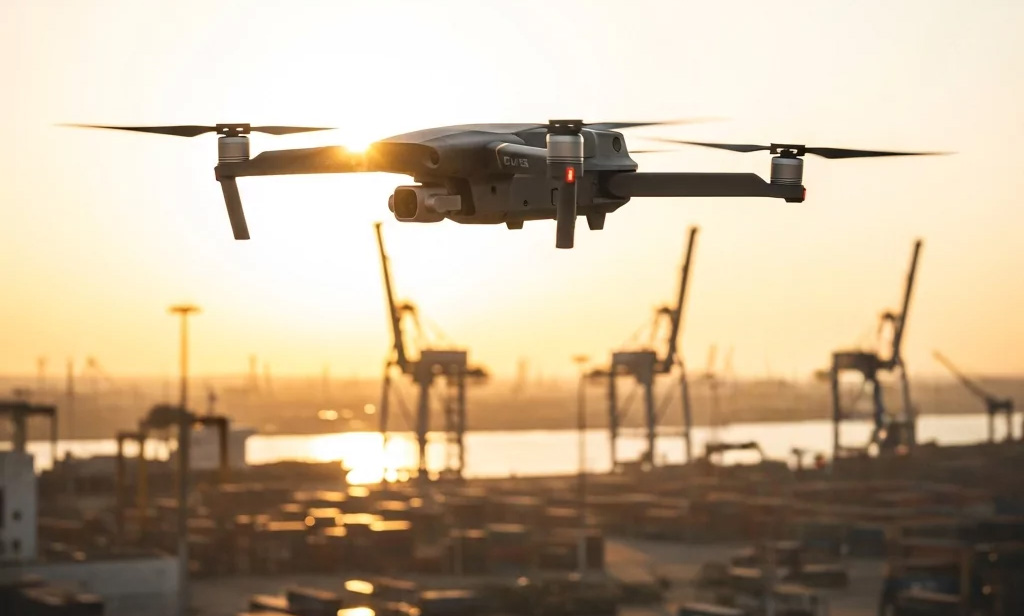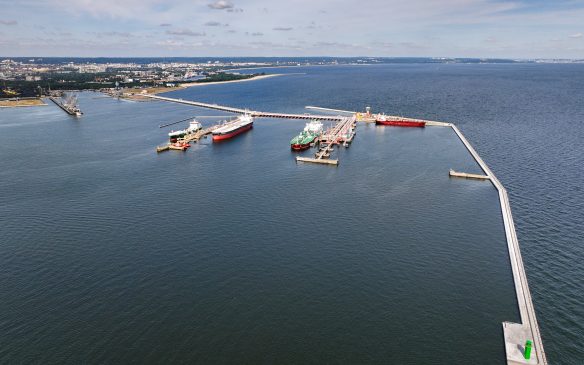Violation of the DRA in the Port of Gdańsk? Here’s what you should expect

An increasing number of people use unmanned aerial vehicles (UAVs), commonly referred to as ‘drones,’ as a tool for work, entertainment, or for filming interesting aerial events. However, flying without restrictions is not allowed everywhere. The Port of Gdańsk, something of fundamental importance to the national economy, is included in a special Drone Restricted Area (DRA). Their violation can end not only with confiscation of the drone, but also a financial penalty of up to PLN 24,000 and, in extreme cases, even imprisonment.
What is a DRA?
A DRA is an area with specific restrictions or a total ban on flying unmanned aerial vehicles. They are designated in places of strategic importance for national security, such as seaports, refineries, power plants, military bases and airports.
At the Port of Gdańsk, the DRA is designed to protect cargo handling infrastructure, ship traffic and the safety of employees and passengers. If a drone is in the wrong place, it can disrupt port operations, pose a threat to shipping or interfere with rescue services.
‘Any unauthorised flight of an unmanned aerial vehicle in the DRA is treated as a potential threat to the safety of the port and people within its territory. It’s not about restrictions – it’s about the safety of people and infrastructure’, says Ireneusz Litwinowicz, head of the Operations Centre at the Port of Gdańsk.
Severe consequences – up to 5 years in prison
The violation of the flight ban in the DRA is not a minor offence. According to Article 212 of the Aviation Law, a person who, while flying a drone:
- violates the air traffic regulations in force in a given area,
- breaks flight bans or restrictions introduced for reasons of public safety,
faces a penalty of up to 5 years’ imprisonment.
If the perpetrator acted unintentionally, they face a fine, restriction of liberty or imprisonment for up to one year. In practical terms, this means that even an amateur flight made ‘to capture the sunset over the harbour’ can result in criminal proceedings if a violation of a protected area occurs.
Financial penalties – up to PLN 24,000 for a single violation
In addition to criminal liability, drone operators face strict financial penalties. How strict exactly?
- PLN 10,000 for a flight that does not comply with the conditions applicable in a given area,
- PLN 10,000 for failure to register as an operator,
- PLN 4,000 for flying in the ‘open’ category in violation of the rules set out in EU regulations.
This can add up to PLN 24,000 in fines for a single incident. The amount of the penalty is determined by the President of the Civil Aviation Office, and the most serious cases may be referred to the public prosecutor’s office.
A practical example
‘Last year, at one of Poland’s ports, a drone flew into the cargo handling area and caused a temporary suspension of crane work. The drone operator explained that he ‘did not know about the ban’. The port authorities reported the incident to the police and the Civil Aviation Authority, and proceedings were initiated against the man for a violation of the air traffic regulations’, said Ireneusz Litwinowicz. ‘This shows that ignorance does not exempt one from responsibility. Every operator is required to know the rule of flight in the space in which they operate’.
How can we fly legally?
Before launching a UAV drone in the vicinity of the Port of Gdańsk:
- Register as an operator on the drony.gov.pl website and mark your drone with your operator number.
- Depending on the weight of the drone, it may be necessary to complete free online training and pass an exam in advance.
- Before each flight, it is necessary to check the availability of airspace in the Drone Tower application and fly in accordance with the regulations, e.g. by keeping the drone within sight and below the maximum altitude of 120 metres.
- It is prohibited to launch a drone without the consent of the site manager – at the Port of Gdańsk, each flight requires prior approval after submitting the relevant documents.
Conscious compliance with the rules is not only about avoiding penalties, but above all about the safety of people and infrastructure.
A drone is not a toy
Drone technology offers enormous possibilities, but it requires responsibility. Every flight in the port area poses a potential risk to ship traffic, cranes and employees at the terminals.
The safety of the Port of Gdańsk means the safety of maritime transport, the region’s economy and thousands of people. Therefore, before flying a drone at the quay, make sure that you can do it legally, because ignorance can cost more than the value of the equipment.



